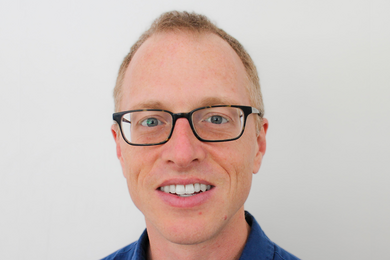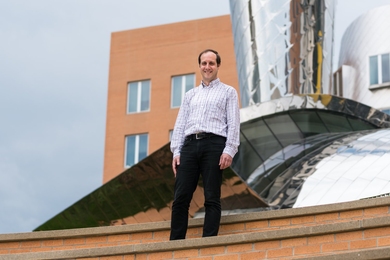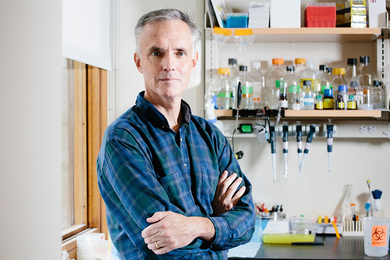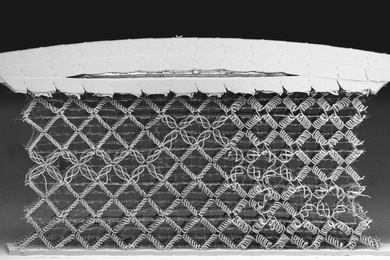An MIT memorial service will be held in the fall for Professor Emeritus Thomas S. Kuhn, who died June 17 at his home in Cambridge at the age of 73. He had been ill for the last two years with cancer of the bronchial tubes and throat.
Professor Kuhn was an internationally known historian and philosopher who made seminal contributions to understanding how scientific views are supported and discounted over time. The author of The Structure of Scientific Revolutions (1962), an enormously influential work on the nature of scientific change, he was widely celebrated as the central figure in contemporary thought about how the scientific process evolves.
In MIT's Commencement address in June, Vice President Albert Gore spoke of the relationship "between science and technology on the one hand and humankind and society on the other" and referred to "the great historian of science, Thomas Kuhn."
Before Professor Kuhn's work, scientific evolution was commonly understood as the patient and progressive accumulation of knowledge about the world. In Structure of Scientific Revolutions, Professor Kuhn rejected this understanding in favor of an historical and social conception, based on a distinction between normal and revolutionary science. Normal science-the dominant enterprise-is puzzle-solving: scientists solve problems within settled frameworks of inquiry that are not themselves tested but simply taken for granted. They model their solutions on scientific paradigms-the exemplary solutions to once-outstanding puzzles that scientists master as part of their training (for example, Newton's derivation of planetary orbits from his laws of motion).
In revolutionary periods (for example, the overthrow of Newtonian by relativist mechanics), Professor Kuhn said, unsolved puzzles or anomalies accumulate, and some scientists propose alternative frameworks of inquiry, often profoundly discontinuous with earlier views. Revolutions succeed when a new, incommensurably different outlook is better able to handle the previously unsolved anomalies and win the allegiance of younger scientists. In Kuhn's vision, then, science is not a smooth evolution of human knowledge, but an historical process in which periods of relative calm are punctuated by dramatic breaks in understanding.
From 1982 to 1991, when he retired, Dr. Kuhn was the first Laurance S. Rockefeller Professor in Philosophy at MIT.
Jed Z. Buchwald, the Bern Dibner Professor of the History of Science and director of the Dibner Institute for the History of Science and Technology, said Professor Kuhn "was the most influential historian and philosopher of science of our time. He instructed and inspired his students and colleagues at Harvard, Berkeley, Princeton and MIT, as well as the tens of thousands of scholars and students in his own and other fields of social science and the humanities who read his works."
Professor Kuhn joined MIT in 1979 from Princeton University, where he had been the M. Taylor Pyne Professor of the History of Science and a member of the Institute for Advanced Study. At MIT, his work centered on cognitive and linguistic processes that bear on the philosophy of science, including the influence of language on the development of science.
Born in Cincinnati in 1922, Professor Kuhn studied physics at Harvard, where he received the SB (1943), AM (1946) and PhD (1949). He taught at Harvard and at the University of California at Berkeley before joining Princeton in 1964. From 1978 to 1979 he was a fellow at the New York Institute for the Humanities.
His honors included the Howard T. Behrman Award for distinguished achievements in the humanities (1977), the History of Science Society's George Sarton Medal (1982) and the Society for Social Studies of Science's John Desmond Bernal Award (1983). He became a Corresponding Fellow of the British Academy in 1990 and was given honorary degrees by several universities throughout the world.
He was a member of the National Academy of Sciences, the Philosophy of Science Association (president, 1988-90), and the History of Science Society (president, 1968-70).
Professor Kuhn is survived by his wife, Jehane R. Kuhn; two daughters, Sarah Kuhn of Framingham and Elizabeth Kuhn of Los Angles; a son, Nathaniel S. Kuhn of Arlington; a brother, Roger S. Kuhn of Bethesda; and four grandchildren, Emma Kuhn LaChance, Samuel Kuhn LaChance, Gabrielle Gui-Ying Kuhn and Benjamin Simon Kuhn. He previously was married to Kathryn Muhs of Princeton, NJ, who is the mother of his children.
Contributions in his memory may be made to Hospice of Cambridge and mailed to 245 Winter St., Waltham, 02154.
A version of this article appeared in MIT Tech Talk on July 24, 1996.





